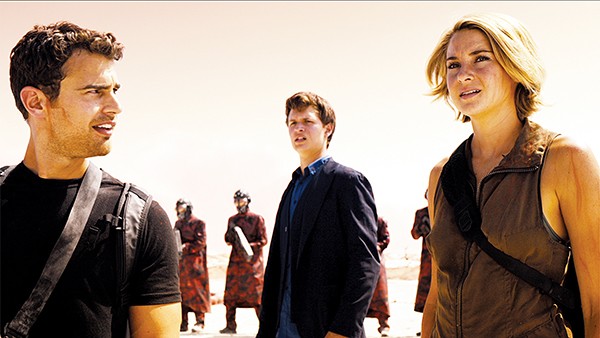For the last decade, publishers and producers have been desperate to emulate the success of Harry Potter. What made The Boy Who Lived into an international phenomenon that launched the most successful young adult series in history and eight movies that were not only financially successful and generation defining, but also fun to watch? For a while, they thought they had found it in The Hunger Games, but even though the films helped launch Jennifer Lawrence’s career and made a truckload of money, they just weren’t very good and limped across the finish line with last year’s hopelessly compromised Mockingjay-Part 2.
Successful young adult novels translate kids’ life experience into allegory. One thing Potter and Veronica Roth’s 2011 novel Divergent have in common is a sorting mechanism, where kids are put into groups that determine the future paths of their lives. At Hogwarts, it’s a magic hat. In Roth’s post-apocalyptic Chicago, it’s an aptitude test that determines which faction they will join in the controlled community of survivors. In this age of high stakes standardized testing, one can see how that would strike a chord with teenage audiences.

That was two movies ago. When the third Divergent film, Allegiant, opens, the caste system has been smashed by Tris Prior (Shailene Woodley) and her brother Caleb (Ansel Elgort), semi-chaste boyfriend Four (Theo James), and frenemies Peter (Miles Teller), Marcus (Ray Stevenson), and Christina (Zoë Kravitz). In the power vacuum left behind after the collapse of the faction system, Four’s mother Evelyn (Naomi Watts), the former insurgent leader, has become a demagogue, holding show trials that involve injecting suspects with truth serum and shooting them in the head when they “confess.” Evelyn has the city in lockdown, but Tris and Four are determined to leave the walled perimeter to investigate the message from the outside world they received at the end of Insurgent. Rebelling against their former allies, they break out of the city’s walls and find new and startling secrets about the true nature of their world.
Or at least the secrets are supposed to be startling. In practice, the bland new villain David (Jeff Daniels), head of the Bureau of Genetic Welfare, the scientifically advanced organization that has been running a long-term genetic experiment in the ruins of Chicago, is a milquetoast presence who goes on at length about the greater good but shows very little sign of actual competence. The same goes for everyone on all sides of this confusing, incoherent conflict. At one point, it occurred to me that maybe the Divergent universe is what happened when Idiocracy finally collapsed under the weight of its own stupidity. This is a world where armies don’t put doors on their armored vehicles, and scientist types walk up to bomb craters and say “This looks radioactive!” Allegiant is a cynical agglomeration of YA and dystopia tropes thrown together with little regard for either sound storytelling or effective world building, which wouldn’t be bad if it weren’t so boring. It’s impossible to pick a standout performance from this cast, whom director Robert Schwentke seems to have instructed to speak in as flat a monotone as possible, so as to give the dimwitted dialog the illusion of gravitas. At the center of it all is the hapless Woodley, who demonstrates what The Hunger Games would have been like if Jennifer Lawrence were a no-talent hack. Who thought this person could carry a $110 million franchise movie? At least she’s fairly paired with James, who is doing something with his voice that I think is supposed to be a Tom Cruise impression.
The only flashes of brilliance in this futuristic clown show is the production design that borrows from the king of 1970s space art, Chris Foss. But if my eyes are roaming around the screen to check out an attractively wrecked space station, your movie has already lost.